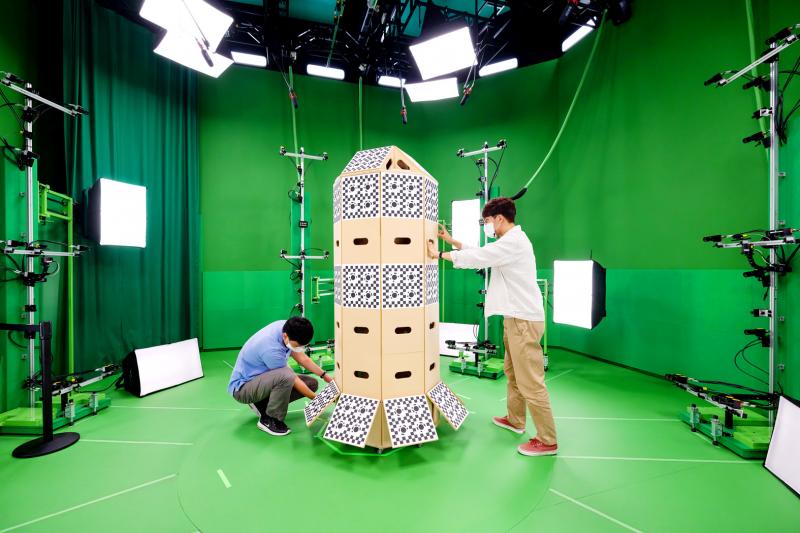South Korean engineer Shaun has big plans to develop the parcels of land he has snapped up for millions of won (thousands of US dollars) in recent years into long-term moneyspinners.
“I’m planning to design my building which is suitable to host K-pop live performances and K-drama screenings,” the 30-year-old investor said. “That can probably lead to a profitable business model in two to three years.”
And construction won’t be hampered by any coronavirus pandemic-spurred labor shortages or increased costs. Shaun’s grand project is all in the blockchain-based virtual world Decentraland.

Photo: Bloomberg
The “metaverse” may be a futuristic prospect for most of the world, but it’s increasingly a reality in South Korea where soaring home prices and income inequality have enticed the so-called Generation MZ, or Gen MZ, into alternative online worlds.
Their digital avatars play games, walk around with friends, host social gatherings, shop and party — and make plans to build cities and profitable businesses.
Shaun, who declined to be identified other than by the name of his Decentraland avatar, has gradually immersed himself in the platform over the past three years.

Photo: Bloomberg
Users can buy land in this virtual world with the aim of hosting real businesses there, like a nightclub that charges users for access. Just like in the real world, the success of the businesses and the communities around them can raise the value of your virtual land.
And investment managers, telecom firms and even the South Korean government are all plugging in.
Samsung Asset Management expects its Samsung Global Metaverse Fund, launched in late June, to easily beat its goal of drawing 100 billion won (US$86.49 million) by the end of this year, with around 1-2 billion won flowing in everyday.
Choi Byung-geun, Samsung Asset Management vice president, said interest in the metaverse had grown since the pandemic as people worked remotely. The Samsung fund launched just two weeks after KB Asset Management’s KB Global Metaverse Economy Fund.
“With global big tech companies such as Facebook seeing their business direction shifting toward the metaverse, the industry is raking in money,” Choi said.
SK Telecom, the country’s largest mobile carrier, launched a metaverse “ifland” in July where denizens can host and attend meetings with other animated avatars.
“As the social trend shifted to non-face-to-face due to the pandemic era, the demand (for metaverse services) jumped,” an SK Telecom official said. “There are thousands of rooms being created everyday and tens of thousands of daily users.”
SK Telecom is part of a “Metaverse Alliance” launched by the South Korean government in mid-May that includes more than 200 companies and institutions.
A Ministry of Science and ICT official said the government hopes to play a lead role in the metaverse industry. In a 604.4 trillion won budget for next year unveiled last week, the government earmarked 9.3 trillion won to accelerate a digital transformation and foster new industries such as the metaverse.
MZ GENERATION
South Koreans have been especially open to the attractions of the metaverse, even though it remains unclear to what extent a full replication of real life is possible, or how long it will take to develop.
Social experts attribute the interest to the disgruntled MZ generation — a term coined in the country that merges Millennials and Generation Z, encompassing those born between 1981 and the early 2010s.
As the coronavirus pandemic has dragged on, a new lexicon has sprung up in South Korea for the “untact” — the opposite of “contact” — economy.
“The craze for the metaverse reflects the sadness and anger of the MZ generation due to polarization,” said Kim Sang-kyun, an industrial engineering professor at Kangwon National University who has published two best-selling books on the metaverse since late last year.
“They do not consider the metaverse as an alternative or replacement of reality, instead it’s just another part of their lives,” said Kim. “They are the generation that has communicated with the world through devices since birth, unlike the older generation.”
For 37-year old Choi Ji-ung, it was frustration with real estate prices and regulations in the physical world that drove him to buy property in geolocation-based platform Earth 2.
Choi’s 50 million won investment in the pricey Gangnam district in Seoul on Earth 2 is something he can only dream of in the real world.
“It was easy to purchase and not as expensive as I thought,” he said.
Fueling many of the metaverse platforms are non-fungible tokens (NFT), intangible digital assets encompassing everything from artworks and videos to clothes and avatars, which are purchased with cryptocurrency.
Decentraland offers a limited number of digital land parcels, or LAND, in the form of NFTs that are acquired using MANA, a fungible token that acts as the game’s currency. MANA, an altcoin, can be purchased with fiat currency on limited cryptocurrency exchanges or in a swap with digital currencies like bitcoin or ether.
As in the real world, land parcels located closer to popular districts are more valuable than others. Some land parcels that sold for about $20 each when Decentraland launched in 2017 now change hands for hundreds of thousands of dollars.
As the platform develops, Shaun and other landowners believe they will be able to make money by using their land for a variety of commercial businesses, such as building concert venues and charging admission for performances.
Changes and developments to Decentraland are overseen by the Decentraland Foundation, which was set up as a nonprofit organization to act on behalf of users.
PROPERTY DEVELOPERS
Wang Keun-il, a 36-year-old fintech entrepreneur, owns lands in North Korea’s capital Pyongyang, Vatican City and Egypt on Earth 2, where he plans to build a profitable tourism or educational business.
Earth 2, which launched in November, is not a fully-fledged metaverse environment, but rather a marketplace for selling digital tiles which represent parts of the Earth. Users cannot currently “enter” the land they have bought, meaning Wang has taken a gamble on a world that is yet to materialize.
Earth 2 Chief Executive Shane Isaac said South Koreans were the most active users on the platform, based on self-affiliation, spending about US$9.1 million, followed by the US with US$7.5 million and Italy with US$3.9 million.
Decentraland said its platform had more than 7,067 active users from South Korea in the 30 days to Sept. 1, second only to the US.
“People won’t forget about or move away from the industry once things return to something resembling normality,” Dave Carr, a communications lead for Decentraland Foundation, said.
“If anything, this period will define the most important, valuable or relevant entities and experiences.”
On the stock market, net purchases of gaming firm Roblox Corp made it the top foreign stock purchased in June and July, Korea Securities Depository data showed.
Shares in local AR and VR technology firms MAXST and WYSIWYG STUDIOS have soared in recent months.
Earth 2 investor Choi is conscious of potential metaverse pitfalls but excited: “Depending on the point of view, some could see it as a ridiculous thing or a bubble, but some see it as an opportunity.”

JUNE 30 to JULY 6 After being routed by the Japanese in the bloody battle of Baguashan (八卦山), Hsu Hsiang (徐驤) and a handful of surviving Hakka fighters sped toward Tainan. There, he would meet with Liu Yung-fu (劉永福), leader of the Black Flag Army who had assumed control of the resisting Republic of Formosa after its president and vice-president fled to China. Hsu, who had been fighting non-stop for over two months from Taoyuan to Changhua, was reportedly injured and exhausted. As the story goes, Liu advised that Hsu take shelter in China to recover and regroup, but Hsu steadfastly

Taiwan’s politics is mystifying to many foreign observers. Gosh, that is strange, considering just how logical and straightforward it all is. Let us take a step back and review. Thanks to the Chinese Nationalist Party (KMT) and the Taiwan People’s Party (TPP), starting this year people will once again have Christmas Day off work. In 2002, the Scrooges in the Democratic Progressive Party (DPP) said “bah, humbug” to that. The holiday is not actually Christmas, but rather Constitution Day, celebrating the enactment of the Constitution of the Republic of China (ROC) on December 25, 1947. The DPP and the then pan-blue dominated legislature

Focus Taiwan reported last week that government figures showed unemployment in Taiwan is at historic lows: “The local unemployment rate fell 0.02 percentage points from a month earlier to 3.30 percent in May, the lowest level for the month in 25 years.” Historical lows in joblessness occurred earlier this year as well. The context? Labor shortages. The National Development Council (NDC) expects that Taiwan will be short 400,000 workers by 2030, now just five years away. The depth of the labor crisis is masked by the hundreds of thousands of migrant workers which the economy absolutely depends on, and the

If you’ve lately been feeling that the “Jurassic Park” franchise has jumped an even more ancient creature — the shark — hold off any thoughts of extinction. Judging from the latest entry, there’s still life in this old dino series. Jurassic World Rebirth captures the awe and majesty of the overgrown lizards that’s been lacking for so many of the movies, which became just an endless cat-and-mouse in the dark between scared humans against T-Rexes or raptors. Jurassic World Rebirth lets in the daylight. Credit goes to screenwriter David Koepp, who penned the original Jurassic Park, and director Gareth Edwards, who knows